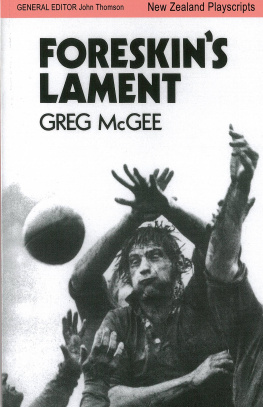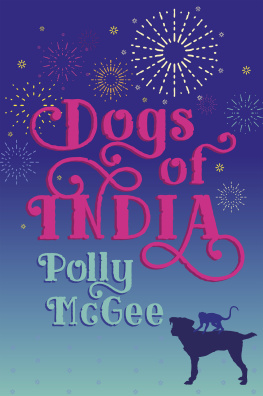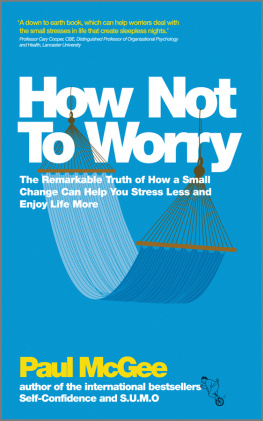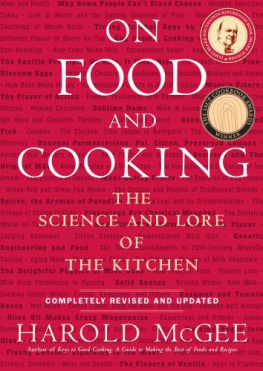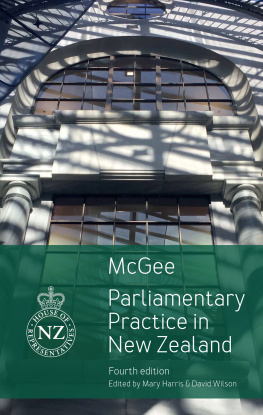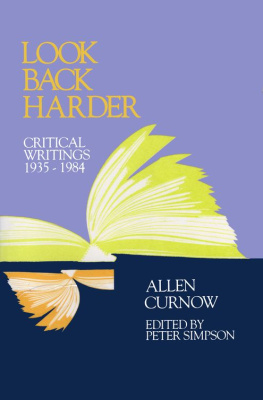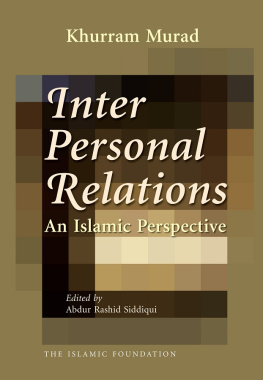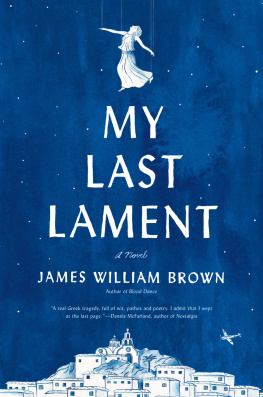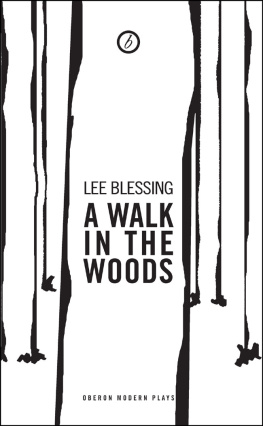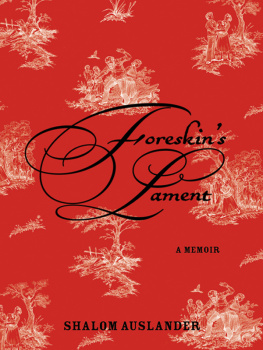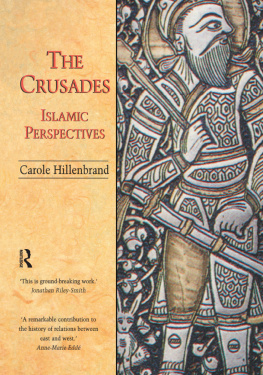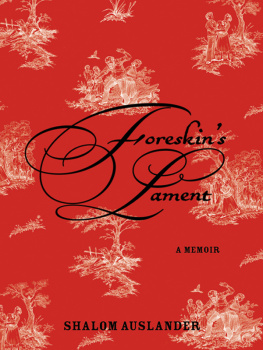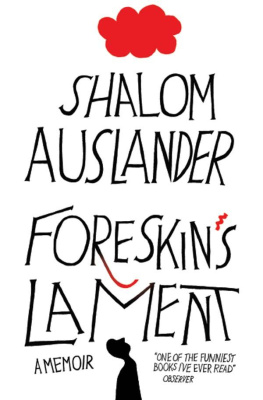A lament is an act of mourning; for Greg McGees Gaelic ancestors it named a pipe air, the dirge for a dead hero. ForeskinsLament mourns the end of heroes, the passing of an age. In the long speech which concludes the play, the formal lament from which it takes its title, Foreskin invokes the legends of his tribe, its heroic lore:
for a whole generation god was only twice as high as the posts. We who know our history by itineraries the cold war of the 50s you say? Oh yes, we remember it well, those front-row problems, Skinner and Bekker. 59? A melange of OReillys creamy thighs, Jacksons jink, DBs size 13s, and a sheep-dog retrieving the ball in a cow-paddock in Morrinsville. Froggies in 61, Poms again in 66 bloody awful! those artistes of 68, Villepreux and Jo Maso, a Pinetree bestriding the 60s with a sheep under each arm, the Bokkies in 73 the ones that didnt come, that never more will come there was one thing we knew with certainty: come winter, wed be there, on the terrace, answering the only call that mattered cmon black! while the nectar flowed till you could almost see the reflection of your youth in its dregs passing passing. I know the lore, I know the catechism.
To the generation for which McGee (the former All Black trialist) speaks, the lore was Law, the Rugby Code a Covenant, and football grounds the shrines of tribal custom. But Foreskins lament is the plaint of a man who finds himself strangely unaccustomed, for whom the myths, with all their remembered potency have lost their magic. When myths no longer serve to incarnate the values of a people, the customs that declare its sense of family, they become the maudlin properties of a lying nostalgia. McGees players dream of epic glory like Andy Haden thrashing Wales with his broken hand:
KOed out of your scone last week, hero this week!
This is the stuff of rugby, this is how legends are made!
But in the demythologised world announced by Clean, where Tupper, the rip-shit-or-bust coach, represents a dying breed, just an old fart left over from the Second World War, legends lose their glow. Twenty or thirty years from now Foreskin says of Clean hell just be a big, fat, dumb heavy, living on delusions of former glory and free beers from fans with long memories looking for immortality in the dregs of every glass. Twenty years ten years in a couple of years, the predictions sound through the play like a melancholy refrain. Only a people which has lost faith in its past fears for its future.
So ForeskinsLament is not just a play about rugby, but (as its workshop producer, Mervyn Thompson, put it), a play about the state of the nation, A.D. 1980. It is identifiably set in 1976, but if we have known our history by itineries, then we shall also remember 1980 as the year in which the Rugby Union drew up its secret itinerary for a Springbok tour and turned its back on history. What Greg McGees play has to show us is that it was never possible to keep politics out of rugby, because in New Zealand (as in South Africa) rugby has been an expression of the polis: This is a team game, son, and the town is the team. Its the towns honour at stake when the team plays, god knows theres not much else around here. The town is the team Tuppers line is almost a paraphrase of Coriolanus, The people are the city, but it practically inverts that democratic slogan. In Tuppers book the town exists only insofar as it is defined by the team: the common goal of his social ideal is entirely self-referential simply that sense of comradeship which comes from the submission of the individual to the common desire for victory. The point of the bloody game is to win he insists: what is to be won doesnt matter, the goal is simply to have a goal. McGee does not cheaply dismiss Tuppers brand of stoic romanticism, his vision of a game which is a test of guts and character, not skill through which a man, an ordinary bloke, can find out a lot about himself and his mates. Indeed McGees most affectionate (as well as his funniest) writing goes into the creation of the aging coach whose passion for the game as the finest thing Ive ever experienced later sweeps him into inarticulate lyricism:
Youre an army man yourself Clean, you know what Im talking about, camder ah, you know, the old camerder ah, comradeship, the common cause.
But its exactly McGees affection for Tupper and the ideal of laconic mateship for which he stands, which gives the plays questioning of old shibboleths its hard (and finally uncompromising) edge. Challenged by Foreskin to argue the question of goals, Tupper simply denies its relevance: for him strength is a matter of silence of not asking the questions:
F ORESKIN : How can we be mates? We dont agree on anything important.
T UPPER : Important? Important my arse. The best mates Ive ever had, we never got past the time of day. Whats important? You just get on with it.
You just get on with it and then where do you get? If the old myths have failed us, if that stoical expression of national self-survival just get on with it has become the slogan of a willed self-ignorance , then McGee wants to know why.
The imaginative hold of rugby on a man like Tupper has less to do with the playing field as a training ground for heroes, than with the club as a kind of surrogate family. Its not for nothing that Tupper calls his players son, or that Foreskin (only half-satirically) calls him dad. For Larry the team replaces the wife and child who left him: I like to be a part of it, Ive no family or anything. If the club-family provides a refuge in which Larry can shelter and sublimate his homosexuality, for the other players it offers the prospect of an indefinitely extended adolescence of masculine camaraderie. On the field, in the showers, men of 29, in flight from adult responsibilities envisaged as suburban nightmare (a wife, a couple of screaming kids and mortgaged to the tonsils), can still be the boys, the lads. Even for the self-seeking Clean, with his commercialised cult of personality (Once youve made the name, you can travel on it.), the club still provides a nexus of security, like the army or the police: You obey orders Youre looked after, no worries. For its other members, the team is not just a haven of male security, but the emotional centre of their existence promising (according to Tupper) the highest, best thing that most of these lads will ever experience in their lives, feeding all those grand emotions missing in the smaller game called life. The ironic paradox McGee pursues is that a society, whose predominantly calvinist ethic has systematically discouraged the public display of emotion and the recognition of emotional contact, should discover its self-image in the extravagant contact sport of rugby. Irish makes the point with characteristically sardonic humour:
Its so bloody boring. Push, pull your head out, run about till you find another heap of fellas, find a hole to stick your head in where its dark, push again, pull it out, run along to the next heap.
McGee is not making the obvious gibe about locker-room homosexuality though the game of mock-buggery with which Clean and Irish humiliate Larry exposes the extent to which repressed homosexual feeling feeds their cruelty and contempt. But this is part of a larger theme, the plays concern with a society emotionally stunted by hatred of its own sexuality. The innocent rugby childhood which Foreskin mourns includes times of closeness, father and son, brother and weary brother, waking very early on cold mornings, huddling together under a blanket in front of a wireless. But the contacts are all male: fathers, sons and brothers, united in the surrogate orgasm of conversion

